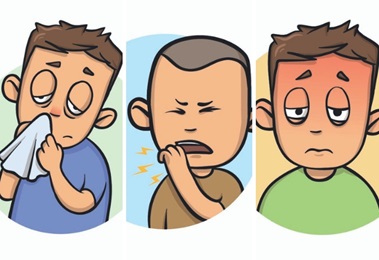The Do’s and Don’ts of Easing Cold Symptoms
At the first sign of cold symptoms, you may look to stock up on any number of remedies. But what actually works? While there is no cure for the common cold, there are some proven ways to treat your symptoms. Here’s a guide to what works and what to avoid.

Stay hydrated. Whether its tea, warm water with lemon or broth, drinking warm liquids can be soothing, prevent dehydration and ease congestion. Avoid salty foods, alcohol, coffee and sugary drinks, which can be dehydrating. Ice chips are another simple way to stay hydrated and calm a scratchy throat.
Gargle with salt water. A saltwater gargle with about 1 teaspoon of salt per cup of warm water can help reduce the pain and swelling of a sore throat.
Over-the-counter medications : Over-the-counter decongestants, antihistamines and pain relievers, such as ibuprofen or acetaminophen, can reduce some cold symptoms. Children younger than 6 should not use over-the-counter medications. Talk to your doctor for more details.
Humidify the air . Cold air holds less moisture than warm air. Dry nostrils are more prone to viruses, and if you’re already sick, dry air can worsen a sore throat. Try using a humidifier. If you don’t have one, leave a shallow bowl of water out, particularly near a heat source. As the water evaporates, it’ll slowly humidify the room.
Rest : This is the time to recharge your body’s immune system. Rest and sleep are the best ways to do that. Make sure you’re sleeping between eight to 10 hours at night. This is also a great chance to take a break from strenuous exercise for two to three days.
What to Avoid
Zinc. There’s little evidence to support zinc’s cold-fighting reputation.
Antibiotics. Antibiotics are designed to treat bacterial infections, not viruses.
Vitamin C . At the first sign of cold symptoms, many people turn to vitamin C. However, there’s little evidence that it has an effect on the cold virus. While some studies suggest regular intake of vitamin C can help reduce the duration of cold symptoms, it has no effect if taken after you have cold symptoms.
Smoking . Smoking and exposure to secondhand smoke can further irritate your nose, throat and lungs.
Call Your Doctor If:
- Your symptoms last longer than two weeks.
- Your symptoms worsen or you develop new symptoms, as you could have another type of infection.
- You have a sore throat or fever higher than 100 degrees for longer than three days.
- You’re experiencing intense chest pain and shortness of breath.





